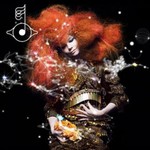Biophilia
Studio Album by Bjork released in 2011Moon | |
Thunderbolt | |
Crystalline | |
Cosmogony | |
Dark Matter | |
Hollow | |
Virus | |
Sacrifice | |
Mutual Core | |
Solstice | |
Hollow (Original 7 Minute Version) | |
Dark Matter (With Choir & Organ) | |
Nattura |
Biophilia review
Bjork’s new idea
Queen of music for the chosen, Bjork, put three years into the making of her eighth long player, which has been long spoken of as an absolutely new form of art. Biophilia is a complex work that, apart from the music itself, offers a whole lot of other data available as IPad applications. However, those who love music will be mostly interested in the music part of Biophilia, and in case with Bjork the only thing you expect is a great lot of the unexpected. Sure, since the release of her previous effort, Volta (2007), the Icelandic singer has not developed great operatic vocals. She still has strained relations with rhythm, and melodies created by her fancy imagination are not taken by many as such. In the meantime, Bjork is no doubt one of the most standout figures in today’s music world, and her new album Biophilia will remind us of that once more. The music from the Icelandic diva is still an improvised structure of mysterious instruments, strange vocals and shuffling rhythms impossible to analyze. Only this time this whole concept has moved to a whole new level.
Even for Bjork, this album is an experimental one
As a matter of fact, Biophilia is in the first place an experimental work involving a wide range of musical exercises and song-writing liberties. And we are speaking about Bjork all of whose albums could be characterized that way! Take for instance a weird device called gameleste, a derivative from gamelan, an ancient Indian percussion instrument, and celeste. It plays in several tracks on Biophilia, including single Crystalline with the easiest catchable and even enjoyable rhythm, and Virus, a song lacking the classic verse-chorus foundation, yet blessed with a very fascinating tune. A couple of listens to Biophilia will notice to you that the title of the majority of tracks here bear apparently abstract images calling for associations with space and some basic natural processes. Their music content supports the stated form. What do you think of Cosmogony, an epic piece with choral insertions and repeated hymnal passages? Hollow, and Mutual Core pursuit the same effect of all-embracing captivation and profoundness, yet via different means. These tracks are based in contrast of remote concepts. Hollow alternates episodes of rest and relaxation with those of suspense, and Mutual Core fuses samples of ancient and majestic organ with contemporary upbeat electronica.
Music is the most valuable part of Biophilia
Like it or not, the essence of the Biophilia experiment is the formation of a new side to the music as it builds on a new attribute. IPad apps of Biophilia include textual and graphical data directly tied with the music of the album. Each of the ten tracks has this kind of resource. Probably, Bjorn went too far in that direction. Her best-known struggle for being not a step, but a whole loop ahead of the rest of the racers has on many occasions motivated her to make very interesting and original moves seeming valuable and justifiable from the point of view of arts and music in particular. Here, one can find nothing more but Bjork’s attempt to distract the listener from the songs. Biophilia strikes you hard, leaving wide and deep traces on your mind, yet you’re offered something else. Maybe, the singer tries to make up for what some people see as a drawback still unsolved since her past works. We still can and will speak of the lack of really classy tunes on Biophilia, about how hard Bjorn holds on to her lulling vocals, being unable to offer any other vocals, and about her persistent engagement with exotic sounding due to impossibility to work with classic sound with the same efficiency. But she does not need any of those! Bjork has to remain what she is; otherwise her music will lose everything it has as soon as it starts resembling other performers. Well, fortunately, nothing like that has happened so far.

